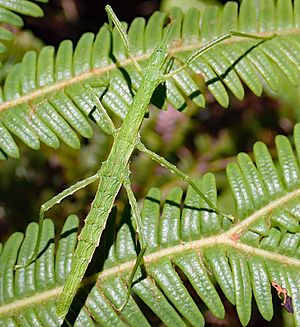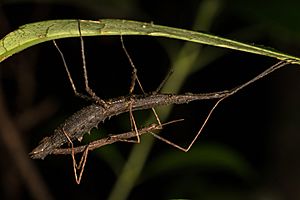Spinotectarchus facts for kids
Spinotectarchus acornutus is a special type of stick insect that lives only in New Zealand. It's often called the spiny ridge-backed stick insect because of its unique look. This insect is the only one of its kind in the Spinotectarchus genus, and it belongs to the Diapheromeridae family.
Quick facts for kids Spinotectarchus |
|
|---|---|
 |
|
| A green Spinotectarchus acornutus in Kaimai Mamaku Conservation Park | |
| Scientific classification | |
| Kingdom: | |
| Phylum: | |
| Class: | |
| Order: | |
| Family: |
Pachymorphinae
|
| Genus: |
Spinotectarchus
|
| Species: |
S. acornutus
|
| Binomial name | |
| Spinotectarchus acornutus (Hutton, 1899)
|
|
About the Spiny Ridge-Backed Stick Insect
These stick insects are quite small. Female stick insects can grow up to about 4.8 centimeters long. Males are a bit smaller, usually between 3.5 and 3.7 centimeters long.
Colors and Looks
Both male and female spiny ridge-backed stick insects come in many different colors and patterns. They can be brown or green. Females are larger and have a more ridged, or bumpy, back. All their legs look like they have tiny "teeth," which makes them appear serrated.
Males are smaller and thinner. Their backs are only slightly ridged, and the "teeth" on their legs are not as easy to see as on the females.
Special Eggs
A cool fact about Spinotectarchus acornutus is that their eggs are covered in short spines. This makes the eggs look a bit hairy! Another type of stick insect in New Zealand, called Asteliaphasma, also has spiny eggs.
Where They Live
The spiny ridge-backed stick insect lives only in the northern part of the North Island of New Zealand. They also live on some of the small islands nearby.
The very first Spinotectarchus acornutus that scientists studied was found on Great Barrier Island in 1899 by a scientist named Frederick Hutton. That first insect is now kept safe at the Canterbury Museum in Christchurch.
These stick insects like to live in native forests and areas where forests have grown back after being cut down. You can often find them on certain plants like Metrosideros perforata (which is a climbing rata), Dendroconche scandens (a fragrant fern), Collospermum hastatum (a plant that grows on other plants), and Dysoxylum spectabile (a tree called kohekohe).


